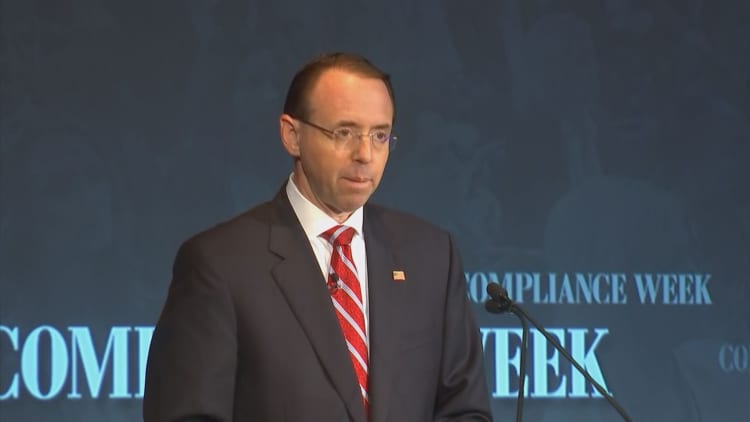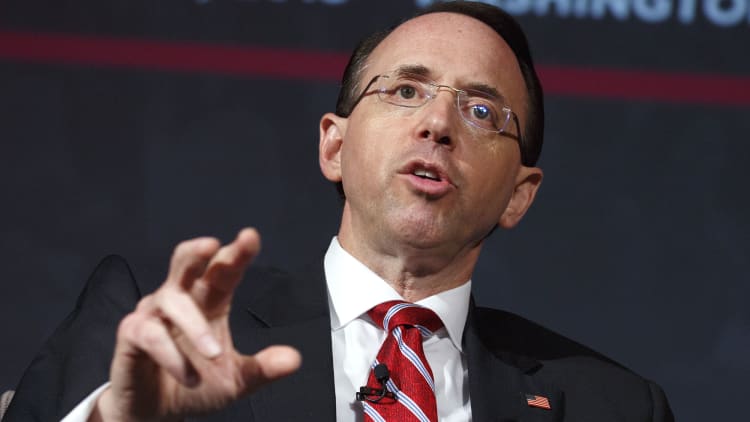
The president asked, and the Justice Department appeared to deliver.
President Donald Trump on Sunday demanded a review regarding the use of an alleged FBI informant targeting members of the Trump campaign. Within hours, the Justice Department referred the matter to its internal watchdog, the Office of the Inspector General, for investigation.
Trump's pointed demand to the executive agency seems to break years of precedent, experts told CNBC. But the Justice Department's quick response, while at first glance appearing to validate the president's wish, could indicate a more pragmatic move from a department whose leaders' jobs have been regularly threatened.
Presidents have historically taken care not to make specific investigative requests of their Justice Departments, said Stephen Vladeck, a University of Texas School of Law professor specializing in national security issues. Doing so could create the appearance that the investigations are being done for political reasons.
'The single least-appropriate instance'
But Trump's demand, which followed his unsubstantiated claim that an informant had been "implanted, for political purposes" into his campaign, goes even further, Vladeck said.
"In this context, it's not just a political decision. It's a political decision to investigate the people that are investigating him," Vladeck said in an interview. "Even if it was ever appropriate, this seems to be the single least-appropriate instance."
Eric Columbus, who was senior counsel to deputy attorneys general during the Obama administration from 2009 to 2014, agreed with Vladeck's assessment of Trump's demand.
"It's not normal," Columbus said. "I'm hard-pressed to think of instances before this presidency where the president informs the Department of Justice to do something so specific."
On Friday, The New York Times, citing people familiar with the matter, reported that the alleged FBI informant was sent to talk to some of candidate Trump's campaign advisors, including former policy aides Carter Page and George Papadopoulos. The informant also looked into other campaign associates such as Michael Flynn, who would become Trump's first national security advisor, and former campaign chief Paul Manafort, the Times reported.
Trump tweeted earlier Friday that if the reports of an informant in his campaign are true, it would constitute the "all time biggest political scandal!"
Two days later, the president took to Twitter to demand an investigation into whether his campaign had been monitored "for political purposes."
By Sunday evening, the Justice Department confirmed that it had referred the matter to Inspector General Michael Horowitz, folding Trump's demanded inquiry into a probe of the FBI's acquisition of warrants to monitor Page during the campaign.
"The Department has asked the Inspector General to expand the ongoing review of the FISA [Foreign Intelligence Surveillance Act] application process to include determining whether there was any impropriety or political motivation in how the FBI conducted its counterintelligence investigation of persons suspected of involvement with the Russian agents who interfered in the 2016 presidential election," a Justice Department representative told CNBC.
ABC News, meanwhile, reported that Deputy Attorney General Rod Rosenstein and FBI Director Christopher Wray would head to the White House on Monday afternoon. The president's demand would be part of the conversation, according to ABC.
NBC News confirmed that Trump would indeed meet with the two law enforcement officials, although a White House representative said that the meeting was scheduled before the president's weekend tweets.
The White House did not immediately respond to CNBC's request for comment.
Twists, turns and a 'savvy move'
The warrant on Page, who stepped away from the Trump campaign in September 2016, was a major focus of a memo drafted by the House Intelligence Committee's Republican majority that became a rallying cry for critics of the Justice Department's actions.
That memo said that a dossier — which alleged salacious connections between Trump, his associates and Russia — "formed an essential part" of the basis for launching a surveillance case against Page. A rebuttal from the highly partisan committee's Democratic minority countered that Page was on the FBI's radar long before the dossier surfaced. Horowitz began his investigation of the FISA warrants in March.
Shortly after Trump tweeted his demand, Rosenstein said in a statement that, "If anyone did infiltrate or surveil participants in a presidential campaign for inappropriate purposes, we need to know about it and take appropriate action."
Columbus considered the response to be "a savvy move by Rosenstein" to refer the matter to the inspector general.
The deputy attorney general, who made the recommendation to appoint special counsel Robert Mueller after Attorney General Jeff Sessions recused himself from the Russia probe, has long been a target of Trump's ire.
"Rosenstein bends but doesn't break," Columbus said. If his survival requires "making concessions to Trump that are less important than preserving Mueller's independence, then Rosenstein has shown that he is willing to do so."
Vladeck described the calculation in similar terms. "Referring to the inspector general was a savvy effort by Rosenstein to try to defuse the situation," Vladeck said, "rather than challenge the president or do his bidding."
He added: "The inspector general's job is to police the DOJ, and so this is exactly right for them."
Trump has also demonstrated mixed feelings about the internal watchdog in the past. When former FBI Deputy Director Andrew McCabe was accused of making misleading statements to investigators regarding his leak of information to a reporter, Trump seized on the report as proof that McCabe "LIED! LIED! LIED!"
However, he complained in February that Horowitz was "an Obama guy" who lacked prosecutorial power in investigating "potentially massive FISA abuse."
'A critical error'
To be sure, some see Rosenstein's snap decision as a misstep.
Assenting to Trump's request so quickly was "a critical error," said Claire Finkelstein, director of the University of Pennsylvania's Center for Ethics and the Rule of Law. The president's lawyers, out of concern for the special counsel's interest in the potential obstruction of justice, may have dissuaded Trump from pursuing this line of attack of their own accord, Finkelstein said.
Instead, it looked as though Rosenstein "jumped the gun in an effort to try and look nonpartisan in his approach," she said.
Finkelstein said it's possible Rosenstein's action was based on his concern with the DOJ's appearance of impartiality.
But in an effort to maintain that natural image, she said, "he may have created more problems for the Justice Department than he needed to."
WATCH: WH demands DOJ investigate FBI tactics



